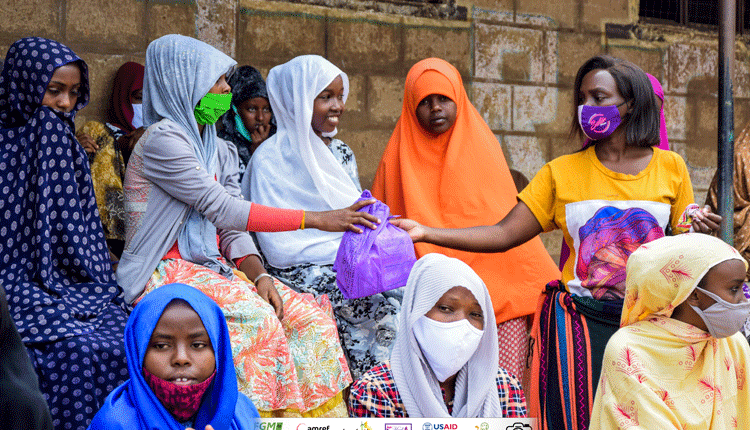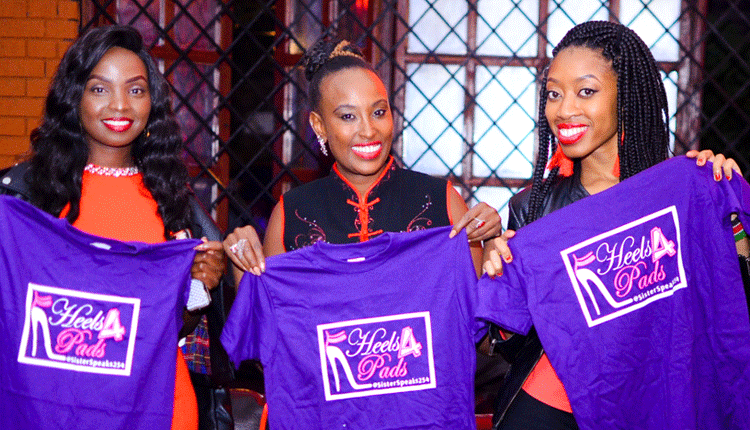How trio is changing lives of girls, women
By Kwach Wakhisi, September 20, 2021When Angela Waweru, Monicah Muhoya and Angela Wambui decided to team up, their goal was to leave a lasting impact on society. They defied all doubts and took a leap of faith to make a difference.
The trio runs SisterSpeaks Global (SSG), a female-centred events organisation where they curate events that empower women to reach their full potential, increase their networking capacities, expand dialogues while offering them training and skills to prepare them for the future of work and to enhance their economic opportunities.
“We use digital media to create content that provides educational and inspirational resources, including spotlighting sisters from across the globe who embody the spirit of excellence, leadership and create equal opportunities for all,” says Waweru.
They also run the Heels4Pads Foundation, the organisation’s charity arm, founded to reach and impact girls and women from low-income communities through a menstrual health approach.
“At Heels4Pads, we design campaigns and interventions to raise awareness on period poverty and its consequences on girls and women’s lives.
We support them with products, menstrual hygiene and health education as well as life skills to reach their full potential,” adds Waweru.
So how did the trio start this venture?
“We knew each other on a personal level and had expressed our desire to work on projects to connect and empower women and girls in Kenya,” says Waweru.
One day, when all the three of them met, they organised an event on April 7, 2019 and then SisterSpeaks Global was born.
A month later, Monicah, who had seen first-hand the issues street girls and women face during their periods, coined and launched Heels4Pads as the organisation’s corporate social responsibility initiative.

“The idea started when Monicah was clearing her shoe rack and had heels she had wanted to give out to her younger cousins, but not all wore her shoe size. Having just started SisterSpeaks Global, Monicah had also identified May 28 as Menstrual Hygiene Day.
We had thought of doing something to support women and girls who couldn’t attend our events and the one thing we all could connect through is pads.
During our meeting, she proposed that we identify about five wearable high heels that we no longer wore to give out in exchange for pads.
We immediately agreed that this was a winning idea and worked through a digital campaign and from that coined the name Heels4Pads because it embodied what we were aiming to do,” Waweru explains.
Waweru and Wambui have both lived and grown in the UK and US respectively, hence by founding SSG, they wanted to bring together the international exposure and experience on women issues combined with their educational background in media, education, ICT and business.
In addition, the team has gone through some fellowship programmes. Waweru is a Young African Leaders Initiative alumna and Monicah is certified by the United Nations Institute for Training and Research programme on Social Entrepreneurship, Leadership and Innovation for Women in the Horn of Africa.
It was during one of her visits to Mathare slums that Monicah identified the menstrual management challenges street girls and women experience.
This inspired the idea to reach out to her social media network to raise pads. Over 1,000 packets of pads were donated.
The success of the online fundraiser presented an opportunity to use social media to raise more awareness on period poverty.
The founders are also part of the Menstrual Health Management Alliance and other water, sanitation and hygiene forums advocating for policy change and the need to take up space using digital media to develop campaigns that deconstruct period myths to safeguard lives of girls who are sometimes taken advantage of and lured into actions such as sex for pads.
Since 2019, the foundation has reached over 15,000 beneficiaries with menstrual products, and facilitated menstrual health education and mentorship across 10 counties in Kenya.
“Covid-19 has affected and exacerbated poverty. We are in the process of rolling out a sustainable project as schools have reopened to ensure girls do not miss out on education and parents are relieved of the burden of buying sanitary towels,” Wambui says.
“The programme will ensure inclusion because it will be in conjunction with schools’ guidance and counselling heads to ensure girls, boys, teachers, and parents are part of the period conversation.
This is with the intent of reducing girls’ absenteeism from school during menstruation and eliminating period shaming,” she adds.
By running the initiative, Waweru says they have gained a better understanding of various challenges faced nationally, learnt how traditions and religion play a huge role on how the topic around period is viewed.
“Covid-19 threw a curveball at our foundation projects as we had to postpone our plans of working closely with schools. Nonetheless, it has brought to light how menstrual health can’t be ignored.
With growing cases of teenage pregnancy and alleged reports of transactional sex for pads, it highlights the importance of having favourable policies and ensuring girls understand the intersection between menstrual and sexual health rights,” she offers.
They have digitised their heels4pads exchange market by running an Instagram shop @h4pXchange where ladies can purchase heels for Sh600, which ensures a girl will be covered with a year’s supply of sanitary pads.
“Our work is needed now more than ever. We have remained consistently focused on not trying to avoid the challenges but using them to strengthen our project.
We have found ourselves expanding our services to include non-perishable food items donated in our dignity kits that have helped former domestic workers who lost their jobs and also carry out community sensitisation on Covid-19,” adds Wambui.
Among the projects include travelling to Turkana together with Ajuma Foundation, Marsabit and Samburu counties with Amref to advocate for MHM and distribute pads.
One of their proudest moments is being presented as the Beauty with a Purpose project at the Miss World International contest in London by Miss World Kenya 2019-2021.
In two years, they have supported over 15,000 girls and women nationally. Their plan is to kick-start their sustainable project in schools where they aim to support a minimum of 50,000 school girls across the 47 counties within their first five years of operation to ensure girls have education through innovation.
